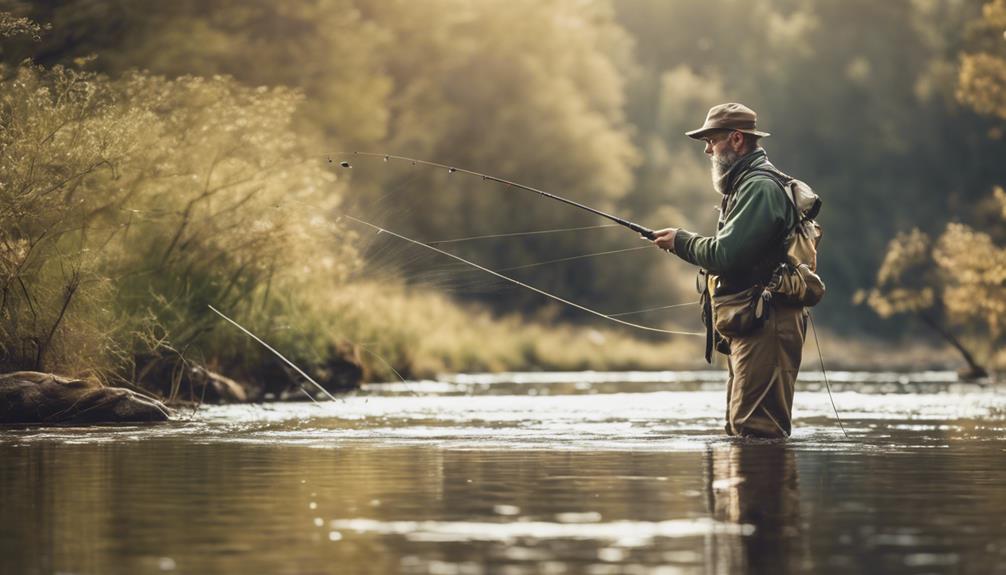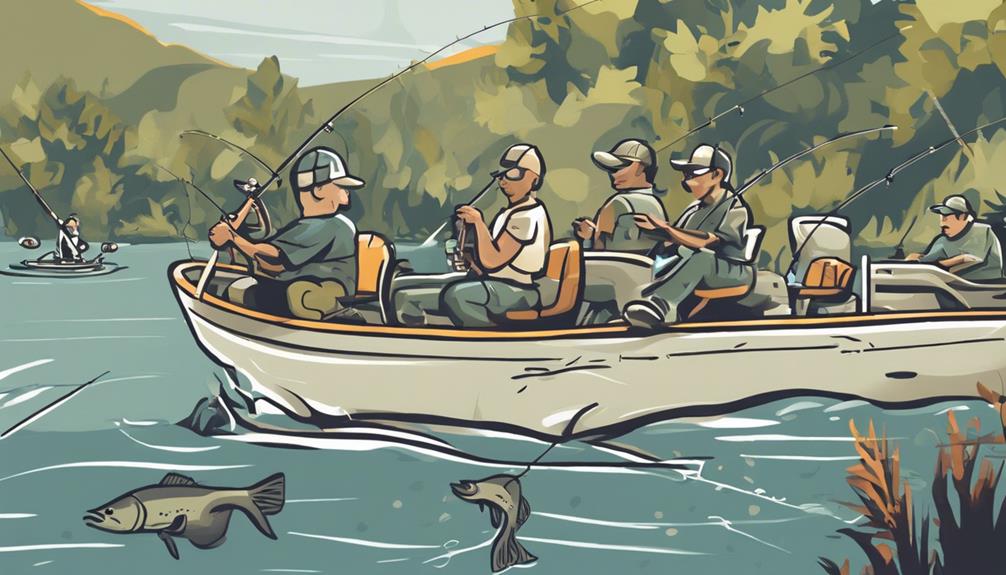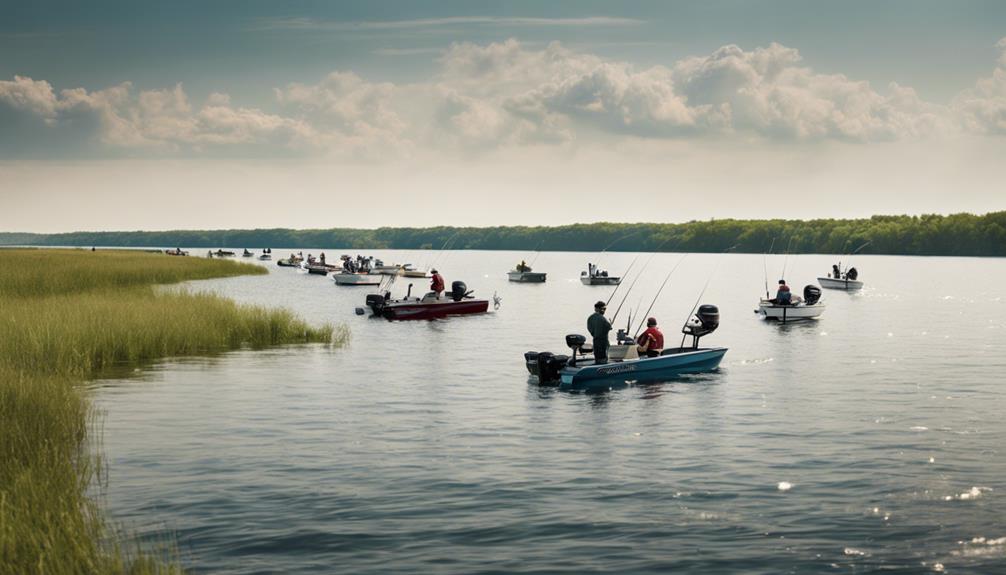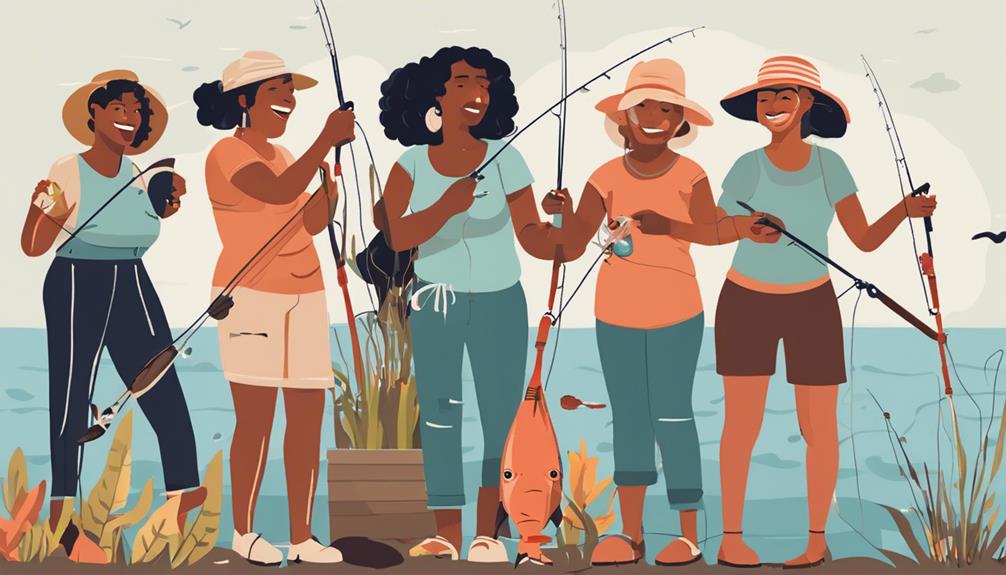To excel in competitive fly fishing tournaments, focus on gear selection tailored to the fishing conditions and species you're targeting. Master fly casting by honing accuracy and technique, emphasizing wrist movement and power. Understand insect behavior to choose the right flies that mimic natural prey. Perfect presentation techniques through practice to enhance accuracy and mending skills for drag-free drifts. Locate prime fishing spots by studying the underwater topography and observing wildlife for potential hotspots. By organizing your tackle box efficiently, becoming mindful of weather conditions, and practicing proper fish handling, you'll be well-prepared to compete and increase your chances of success.
Gear Selection
When preparing for fly fishing tournaments, prioritize selecting gear that maximizes your performance on the water. The right gear can make a significant difference in your success during competitions. Let's delve into the essentials for gear selection: rod selection, line choice, reel size, and fly patterns.
Rod selection is a critical aspect of gear selection for fly fishing tournaments. The type of rod you choose depends on the fishing conditions and the species you're targeting. For tournaments, consider a versatile rod that can handle various casting distances and weather conditions. A good quality rod that offers both sensitivity and strength will give you an edge in competition.
Equally important is the choice of fishing line. The line weight should match your rod for optimal performance. Consider the water conditions and the size of the fish you're targeting when selecting the line weight. A good quality line that's durable and has low memory will help you make accurate casts and handle fish more effectively.
When it comes to reel size, opt for a reel that balances well with your rod. A reel with a smooth drag system and the right capacity for the line will help you control the fish during intense tournament moments. Additionally, having a variety of fly patterns in your arsenal is crucial. Different patterns mimic various insects and baitfish, increasing your chances of enticing fish to bite. Experiment with different patterns during practice to see what works best in tournament conditions. By carefully selecting your gear, you set yourself up for a competitive edge in fly fishing tournaments.
Mastering Fly Casting
To excel in fly fishing tournaments, mastering the art of fly casting is a fundamental skill that can elevate your performance on the water. Casting accuracy and technique are paramount in competitive fly fishing. A precise cast can mean the difference between landing a trophy fish or going home empty-handed.
When it comes to casting accuracy, focus on your technique. Practice regularly to hone your skills and develop muscle memory. Pay attention to your wrist movement, timing, and the power behind each cast. Remember, it's not always about casting far; it's about placing your fly accurately where the fish are.
Fly selection and placement are equally crucial. Different flies mimic various insects or baitfish, so understanding what the fish are feeding on is essential. Once you've selected the right fly, ensure you present it naturally by placing it where the fish are most likely to strike. This might mean casting near cover, along current seams, or in feeding lanes.
In competitive fly fishing tournaments, every cast counts. By mastering your casting accuracy, technique, fly selection, and placement, you can increase your chances of success on the water. Practice diligently, observe the behavior of the fish, and adapt your approach accordingly. These skills will set you apart from the competition and improve your overall performance in tournaments.
Understanding Insect Behavior
Understanding insect behavior plays a crucial role in successful fly fishing tournaments, influencing your fly selection and presentation techniques. Insect patterns and feeding habits are key factors that can give you a competitive edge in these tournaments. Here are some essential tips to help you understand insect behavior better:
- Observe the Water: Take time to observe the water surface for any signs of insect activity. Look for rising insects, ripples, or small flies hovering over the water.
- Identify Insect Species: Familiarize yourself with common insect species in the area where you're fishing. Different species have distinct patterns and feeding habits.
- Match the Hatch: Choose fly patterns that closely resemble the insects present in the water. Matching the hatch increases your chances of enticing a strike.
- Study Feeding Habits: Understand how insects behave when feeding. Some insects drift passively on the water, while others actively swim or skitter across the surface.
- Experiment with Presentations: Adapt your presentation techniques based on insect behavior. Try different retrieves, drifts, or swings to mimic how insects move in the water.
Perfecting Presentation Techniques
Mastering presentation techniques is essential for excelling in fly fishing tournaments, where precision and skill play a significant role in attracting strikes from elusive fish. To improve your presentation skills, incorporating practice drills into your routine is crucial. Practice drills help enhance your casting accuracy, allowing you to place your fly precisely where the fish are likely to bite.
When practicing precision casting, focus on accuracy rather than distance. In tournaments, pinpoint accuracy is often more important than casting long distances. Set up targets at various distances and practice hitting them consistently. This will help you develop the muscle memory needed to place your fly accurately when it counts.
Another valuable technique is mastering the art of mending. Mending is the act of repositioning your line on the water to create a drag-free drift. Practice different mending techniques to ensure your fly drifts naturally with the current, mimicking the movement of real insects.
Incorporating these practice drills into your routine will sharpen your presentation skills, giving you an edge in competitive fly fishing tournaments. Remember, precision casting and mending are key elements that can make a significant difference in enticing those elusive fish to strike.
Locating Prime Fishing Spots
For successful fly fishing tournaments, pinpointing prime fishing spots requires a keen eye for detail and a strategic approach. When it comes to locating these optimal locations, understanding the underwater topography and utilizing GPS navigation can significantly enhance your chances of success.
Here are some essential tips to help you identify prime fishing spots:
- Study Underwater Topography: Familiarize yourself with the underwater terrain of the area you're fishing in. Look for drop-offs, weed beds, submerged structures, and other features that attract fish.
- Utilize GPS Navigation: Make use of GPS technology to mark productive fishing spots and navigate between them efficiently. This can help you save time and increase your fishing time.
- Observe Wildlife Activity: Keep an eye out for signs of baitfish, birds diving for food, or other indications of fish activity. These can point you towards potential hotspots.
- Experiment with Different Depths: Fish can often be found at various depths depending on factors like temperature and food availability. Be willing to adjust your fishing depth to match the conditions.
- Move Around and Explore: Don't get stuck in one spot for too long. Be willing to move around and explore different areas to find where the fish are actively feeding.
Time Management Strategies
To optimize your performance in fly fishing tournaments, efficient time management is crucial for maximizing your chances of success on the water. Strategic planning plays a significant role in ensuring that you make the most out of your fishing time during the competition. Before the tournament begins, create a detailed schedule outlining the different phases of the day, including fishing time, breaks, and travel between spots. This will help you allocate your time effectively and prevent wasted minutes trying to decide on your next move.
Productivity hacks can also give you an edge in managing your time efficiently. Consider prepping your gear the night before, so you can hit the water ready to fish as soon as the tournament starts. Additionally, organizing your tackle box in a way that allows quick access to different flies and tools can save you precious minutes on the water.
Time tracking is another essential aspect of effective time management during a fly fishing tournament. Use a watch or a timer to monitor the time spent at each fishing spot. This can help you avoid getting stuck in unproductive areas and guide you in moving to new locations strategically.
Incorporating efficiency techniques like setting specific goals for each fishing session can keep you focused and on track. By breaking down your fishing time into smaller, manageable tasks, you can make the most of every minute on the water, increasing your chances of landing that winning catch.
Weather Conditions Awareness
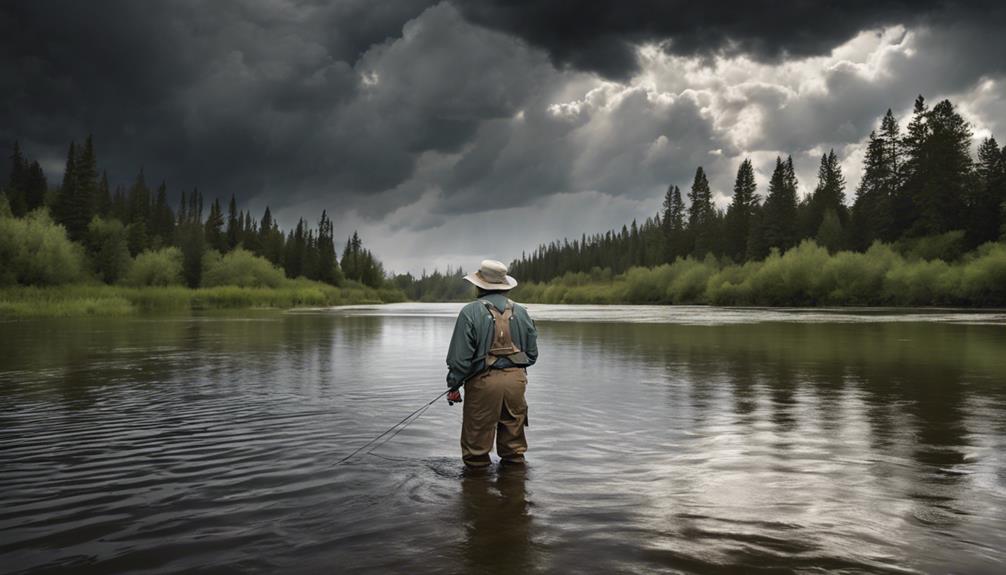
Efficiently navigating weather conditions can significantly impact your success in fly fishing tournaments, requiring astute observation and quick adaptation to optimize your fishing strategy. Weather awareness is crucial for ensuring your safety and maximizing your chances of a successful tournament.
Here are some essential tips to help you master weather conditions during fly fishing competitions:
- Stay Informed: Keep an eye on weather forecasts before and during the tournament to anticipate any changes.
- Safety Precautions: Always prioritize safety by wearing appropriate clothing for the conditions and being aware of any potential hazards like lightning or sudden storms.
- Adapt Your Strategy: Adjust your fishing techniques based on the weather; for example, fish may be more active before a storm.
- Equipment Maintenance: Ensure your gear is suitable for the weather conditions and perform regular maintenance to prevent any issues while on the water.
- Quick Response: Be prepared to change locations or tactics swiftly if the weather shifts unexpectedly to stay ahead of the competition.
Proper Fish Handling
Mastering proper fish handling techniques is crucial for maximizing the health and survival of the fish you catch during fly fishing tournaments. Ensuring fish health isn't just a conservation priority; it's also directly linked to your tournament success. When handling fish, always remember that a gentle touch goes a long way. Avoid squeezing the fish or causing unnecessary stress, as this can lead to injuries that may impact their ability to thrive post-release.
One essential technique is to wet your hands before handling the fish. This simple step helps protect their delicate skin and scales from damage. When holding a fish, support its body properly to prevent any unnecessary strain. Cradling the fish gently and avoiding excessive bending can help maintain its health during the handling process.
Another key aspect of proper fish handling is minimizing the time they spend out of the water. The longer a fish is out of its natural environment, the more it can suffer from stress and exhaustion. Prepare your tools in advance, such as hemostats or forceps, to facilitate a quick and efficient hook removal process.
Tournament Etiquette
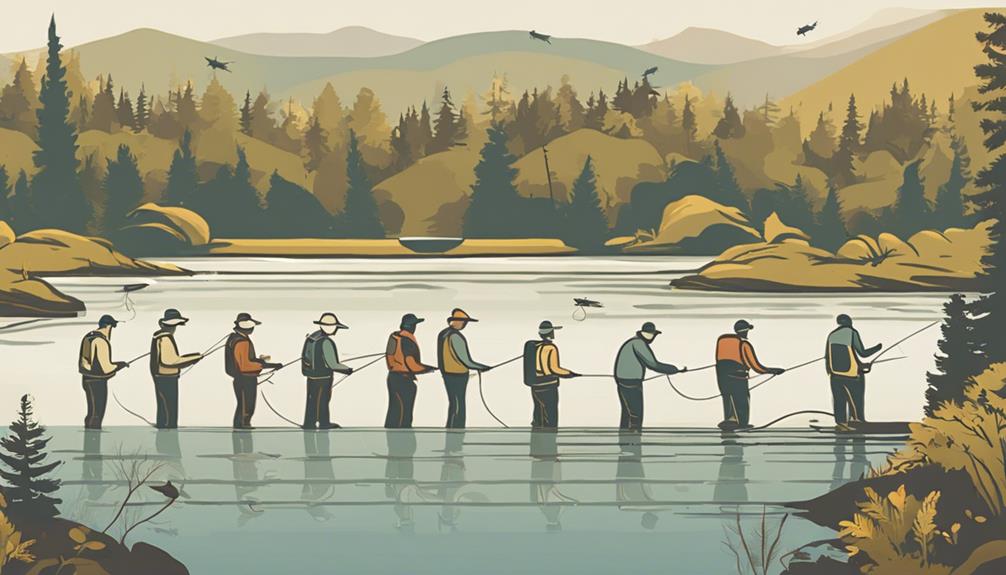
Maintaining proper decorum and respect for fellow anglers is fundamental in the realm of fly fishing tournaments. When engaging in competitive fly fishing, observing tournament etiquette is crucial to promoting sportsmanship, fostering camaraderie, and ensuring mutual respect among participants.
- Respect Fishing Boundaries: Always be mindful of other anglers' space and avoid encroaching on their fishing areas. Respecting boundaries demonstrates your consideration for fellow competitors.
- Practice Patience: In the heat of competition, it's easy to feel rushed or pressured. However, patience is key. Wait your turn, be courteous, and avoid disrupting others while they fish.
- Handle Fish with Care: Show respect for the fish you catch by handling them gently and releasing them properly. This not only reflects your sportsmanship but also contributes to the sustainability of the fish population.
- Communicate Effectively: Clear communication with other anglers is essential. Whether it's coordinating movements on the water or discussing tournament rules, effective communication fosters a positive and respectful environment.
- Celebrate Successes Gracefully: Winning is exhilarating, but remember to celebrate your victories with humility and grace. Acknowledge the efforts of your competitors and maintain a spirit of friendly competition throughout the tournament.
Physical and Mental Preparation
Preparing both physically and mentally is vital for maximizing your performance in fly fishing tournaments. Mental focus is key during competitions. Stay present, focused on the task at hand, and avoid distractions. Visualize your success, imagine yourself making accurate casts, and landing fish efficiently. Develop a pre-competition routine that helps calm your mind and get you in the right headspace for the tournament.
In addition to mental preparedness, physical conditioning plays a crucial role in competitive fly fishing. Build endurance through cardiovascular exercises like running or swimming to ensure you can maintain your focus and coordination throughout long tournament days. Strengthen your core and arms to improve casting accuracy and power. Yoga or Pilates can also help improve flexibility, balance, and overall body awareness, enhancing your performance on the water.
To excel in fly fishing tournaments, it's essential to strike a balance between mental sharpness and physical fitness. Practice mindfulness techniques to enhance your focus and reduce anxiety. Incorporate regular workouts into your routine to build the strength and stamina needed for long days on the water. By prioritizing both mental and physical preparation, you set yourself up for success in competitive fly fishing tournaments.
Post-Tournament Analysis

Conducting a thorough post-tournament analysis is crucial for evaluating your performance and identifying areas for improvement in competitive fly fishing. After a tournament, take the time to reflect on your strategies and outcomes to enhance your skills for future competitions.
Here are five key steps to follow in your post-tournament analysis:
- Data Interpretation: Analyze the data collected during the tournament, such as catch rates, location choices, and fly patterns used. Look for patterns or trends that can provide insights into your performance.
- Performance Evaluation: Reflect on your individual performance during the tournament. Consider aspects like casting accuracy, fish fighting skills, and decision-making under pressure. Identify both strengths and weaknesses.
- Strategy Refinement: Based on your data interpretation and performance evaluation, refine your strategies for future tournaments. Adjust your tactics, location choices, or equipment as needed to improve your chances of success.
- Future Preparation: Use the insights gained from your analysis to inform your future preparation. Focus on practicing areas where you identified weaknesses and continue honing your strengths to stay competitive.
- Review with a Mentor: Discuss your analysis with a more experienced angler. Their feedback and perspective can provide valuable insights and help you refine your strategies further.
Frequently Asked Questions
How Can I Deal With Distractions During a Tournament?
When dealing with distractions during a tournament, mental preparation is key. Practice concentration techniques like deep breathing to regain focus.
Stay in the zone by visualizing success and tuning out external factors. Remember to control what you can control and let go of what you can't.
Stay positive, stay present, and stay committed to your game plan. Trust your skills and stay confident in your abilities to overcome distractions and perform at your best.
What Should I Do if I Hook a Fish but It Escapes?
When a fish escapes after you hook it, stay calm. Focus on your reel technique to prevent it from getting off the hook.
Understand fish behavior to anticipate its movements. Quickly recover by keeping a steady hand and adjusting your approach.
Mentally prepare for the next opportunity by staying alert and ready. Remember, it's all part of the challenge in competitive fishing tournaments.
Stay determined and keep honing your skills.
Is There a Specific Strategy for Fishing in Crowded Waters?
When fishing in crowded waters, casting accuracy is key to avoid tangling lines with other anglers. Utilize stealth techniques like casting parallel to the water's edge or using lighter colored lines to blend in.
Position yourself strategically to maximize your chances of a successful catch without disrupting other fishermen.
How Do I Stay Focused and Motivated Throughout the Competition?
To stay focused and motivated throughout the competition, mental preparation is key. Start by visualizing success and envisioning yourself achieving your goals.
Stay mindful of your surroundings and your actions, focusing on each cast and each movement with intention. Use positive affirmations to boost your confidence and maintain a winning mindset.
What Are Some Common Mistakes to Avoid During a Tournament?
To avoid common mistakes during a tournament, focus on using proper equipment and mental preparation. Ensure your gear is in top condition and suited for the competition.
Stay mentally sharp by visualizing success and maintaining a positive mindset. Avoid distractions that can throw off your game. By being proactive and attentive, you can steer clear of errors that might cost you valuable points in the tournament.
Conclusion
Now that you have mastered these essential tips for competitive fly fishing tournaments, you're well-equipped to tackle any challenge that comes your way. Remember to stay focused, stay patient, and stay confident in your abilities.
By honing your skills, understanding the environment, and respecting the sport, you'll set yourself up for success in any tournament you enter. Keep practicing, keep learning, and keep pushing yourself to be the best angler you can be.
Good luck out there!
